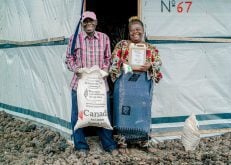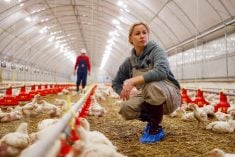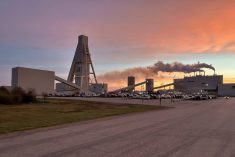SAO PAULO (Reuters) — Brazil’s soybean harvest is expected to occur later than usual due to a drought that has delayed planting and could tighten the local fuel market’s supply of biodiesel in early 2015, the grain crushing industry association Abiove said on Tuesday.
Abiove representative in charge of biodiesel, Leonardo Botelho Zilio, said in an email to Reuters that members of the association had met last week with officials at the energy ministry and at the national petroleum agency last week over possible supply constraints in biodiesel early next year.
Read Also

B.C. ostriches culled, CFIA confirms
Ostriches on an embattled Edgewood, B.C. farm have been culled after a prolonged legal battle, the Canadian Food Inspection Agency has confirmed.
Dry weather in the past months over Brazil’s main center-west grain belt had set planting of the new soy crop back and even prompted some farmers to replant. Normally the center-west state of Mato Grosso, Brazil’s top producing soy state, is first to harvest in late December to early January.
Soybean oil accounts for between 60 percent and 70 percent of the total feedstock for all national biodiesel production. An early harvest is looking very unlikely this season, however, Abiove and producers association Aprosoja said.
The start of harvest “could suffer delays of 20 to 30 days depending on climatic conditions that unfold in the next weeks,” Zilio said.
Despite maintaining its forecast for a record 91 million tonnes soy harvest in the 2014-15 season, Abiove said the late harvest could tighten the country’s supplies of biodiesel, which the government blends at seven percent in all commercial diesel.
After raising the blend from six percent on Nov. 1, the government will now face new inflationary pressures on the country’s fuel markets. The benchmark index for inflation broke out of the 6.5 percent upper limit that the central bank is required to keep inflation below.
The government’s decision earlier in November to raise wholesale diesel prices by five percent will also keep upward pressure on fuel prices, in the short-term as well.
In the first half of 2014, Brazil blended biodiesel at five percent in retail fuel. The additional two percentage points of biodiesel in retail fuel will raise demand from three billion litres to 4.2 billion litres annually.
Weather in the main soybean states has turned wetter in the past month and is expected to get more widespread rains in the coming days to weeks. January and February are often the soy belt’s wettest months. Rains could further delay the harvest of the new crop.














